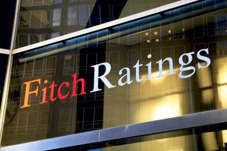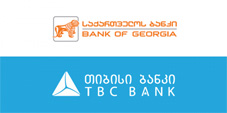International Rating Agency Fitch Affirms 4 Georgian Banks
By Natalia Kochiashvili
Thursday, April 18


As stated in the issue of Fitch Ratings “The Issuer Default Ratings (IDRs) and Viability Ratings (VRs) of TBC, Bank Of Georgia and Liberty Bank, and the VR of ProCredit Bank Georgia, reflect their exposure to the still relatively high-risk Georgian operating environment. These ratings also reflect the four banks' generally sound financial metrics, reflected in reasonable asset quality metrics, strong performance, adequate capitalization, and stable funding profiles and comfortable liquidity.”
Last year, in April 2018, the change was opposite - international rating agency Fitch Ratings increased the rates of TBC and Bank of Georgia from stable to positive at BB- level. The Liberty Bank's rating at B + level is stable with predictions, while ProCredit's BB level is positive according to predictions.
The credit rating assesses the company's, region (municipality) or country's creditworthiness (the ability to return the debt). Credit ratings are calculated based on the past and present financial history of the listed market participants, as well as their asset and financial liabilities (debt). The main goal of the rating is to inform potential lenders/investors about the estimated timely service of financial liabilities of the rating subject (company, municipality or country). Countries need credit rating to achieve security on international markets and attract investments.
The rating agency, which is also called credit rating agency gives credit ratings that show the debt repayment ability. It is a highly concentrated industry. Three companies control 95% of the international market. The largest players in this market are the so-called "big three" members. These include Fitch Ratings, Moody's and Standard & Poor's. The Georgian Ministry of Economy disseminates information that International rating company Standard & Poor's has improved Georgia's sovereign ratings from stable to positive, and the rating is still at the "BB-level" level.
Fitch Ratings International Ratings BBB is good creditworthiness that is accompanied by low probability of credit risks and adequate ability to perform financial commitments in time. Solvency depends on the sustainable and favorable business or economic conjuncture. AAA is the highest credit rating, meaning credit risk is the lowest in this case. Prognosis can be positive, stable or negative. Intermediate evaluation is used for plus (+) or minus (-).
Analysts' opinion about the significance of the ratings to the population is divided into two. One part considers that the ratings will not directly reflect on citizens in the near future, because, as they say, this is one and not the only component that when discussing a serious change for the country.
Others think that positive change can increase the interest of investors towards the country and will act on the existing interest rate, which means its reduction. The experts believe that international organizations are aware of the risks associated with the country while issuing credits and individual interest rates are determined by international ratings. Consequently, the importance of ratings is very high - if the Georgian banks are able to raise the funds at a lower price, the interest rate will be reduced on loans issued by them.
